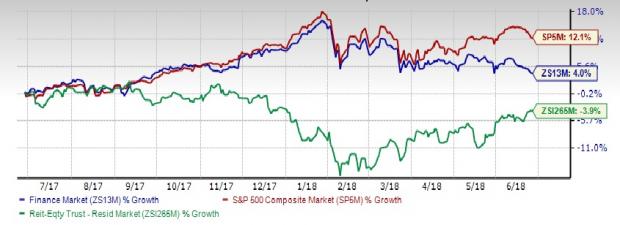The U.S. residential REIT industry’s growth in rent is slowing and there is no near-term respite in sight.
Per the latest report from the real estate technology and analytics firm RealPage, with several markets experiencing flat rents, U.S. apartment rents increased at an annual pace of just 2.3% as of mid-2018, denoting its slowest pace in eight years. While a mid-2018 occupancy level of 95.0% is still healthy, the deceleration in rent growth suggests that a competitive leasing environment is fast building up, and curbing landlords’ pricing power.
Even though solid job growth in recent months indicates more household formations and raises expectations of a revival of the U.S. residential real estate market fundamentals, the struggle to lure renters will quite obviously continue in the upcoming quarters, when much of new supply is likely to come on the course.
According to the RealPage report, the “annual pace of completions†has climbed above the 300,000-unit level for four consecutive quarters. Further, through mid-2019, annual deliveries will keep adding on to the flow with around 300,000 units. So the stressed environment is anticipated to continue in the near term and curtail residential landlords’ ability to command more rents and affect concession levels.
Moreover, the student housing sector, which is part of the residential REIT industry, is lately experiencing a slowdown in leasing velocity and compression in rent growth amid demand-supply imbalances. Specifically, properties away from campus are feeling the brunt.
Industry Lags in Terms of Shareholder Returns
Looking at shareholder returns over the past year, it appears that the broader economic recovery wasn’t enough for enhancing investors’ confidence in the industry’s growth prospect. Elevated supply affected the performance of residential REITs over the past several quarters.
While the stocks in this industry have collectively lost 3.9%, the Zacks S&P 500 Composite and Zacks Finance Sector have rallied 12.1% and 4.0%, respectively.
One-Year Price Performance


